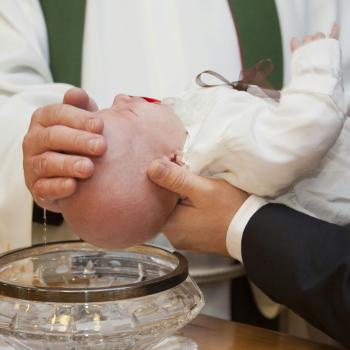Mark the Evangelist thought it was enough to describe Jesus as a prophet, a man whose life and teaching testified to God's action in the world, to the point of giving his life fully in martyrdom. It's a surprise to many readers to learn that in that original gospel—probably the oldest of the four canonical gospels in the New Testament—the story ends just after Jesus' death, with a somewhat cryptic reference to Jesus' tomb being empty (see explanations here and here). There are no resurrection appearances, no memorable scenes with disciples or references to heaven and hell. Just an empty tomb.
I like to think that this original gospel was Mark's way of saying "wait and see." Perhaps Mark wanted to convey a sense of hopeful anticipation of what would come from Jesus' ministry—a hope that in some sense was already beginning to unfold around him, since it's not unlikely that he was a companion on Paul's missionary journeys around the Mediterranean. The leading message that one takes from Mark's gospel is this: "Here is a man who knew the ways of God and was willing to die for them! Let us follow him!"
The writer Tertullian (160-220 A.D.) once observed that the story of the gospel is so strange that it must be believed:
The Son of God was born: there is no shame, because it is shameful.
And the Son of God died: it is wholly credible, because it is unsound.
And, buried, He rose again: it is certain, because impossible. (On the Flesh of Christ V.4)
What Mark gives us is a strange story; it's a ridiculous way to talk about God unless it's true. Why would God choose to be born, instead of arriving in dramatic fashion so there was no question of knowing it was God? And more scandalously, why in the world would God subject himself to an embarrassing trial and death? Mark goes into great detail to describe the events, an even more surprising element of his story since the first half of it reads like a short bullet-list of healings and other miracles and teachings. Mark dwells on Jesus' passion; he wants the reader to feel it and not just acknowledge it. He wants to convey a central theme: Jesus' suffering is real. Yes, even God suffered. You need not fear your suffering, because God himself faced it and was ready to die. And the reason he did that is to show us that there is hope beyond suffering.
Mark's companion Paul understood the import of this theme. As a faithful Jew, Paul was familiar with the prophetic literature, particularly that of the Suffering Servant in the book of Isaiah:
He was despised and rejected by men;
a man of sorrows, and acquainted with grief;
and as one from whom men hide their faces
he was despised, and we esteemed him not (Isaiah 53:3 RSV; more on this theme here).
Yet he was also aware of the demands of the law, particularly regarding criminals:
And if a man has committed a crime punishable by death and he is put to death, and you hang him on a tree, his body shall not remain all night upon the tree, but you shall bury him the same day, for a hanged man is accursed by God; you shall not defile your land which the LORD your God gives you for an inheritance (Deuteronomy 21: 22-23 RSV).
Mark follows Paul in describing Jesus as a man who both challenged and fulfilled the hopes of Israel:
Christ ransomed us from the curse of the law by becoming a curse for us, for it is written, "Cursed be everyone who hangs on a tree," that the blessing of Abraham might be extended to the Gentiles through Christ Jesus, so that we might receive the promise of the Spirit through faith. (Galatians 3:13-14 NAB)
In Mark's eyes, Jesus' martyrdom (Greek martyrion, witness) was a testimony to God's faithfulness, God's willingness to give comfort to people experiencing suffering. It was an act of solidarity with the suffering, an act that would have been impossible if God has chosen instead to arrive in dramatic fashion and compel belief in him. He took on the human condition in order to show the way to live and to die in hope of eternal life.
There is something very honest, I think, about that empty tomb. What is next? The other evangelists fill in the story, and there is much to ponder. But with Mark we have an early sense of wonder, a story whose end has yet to be written. And isn't that how we ourselves experience our lives?
4/18/2011 4:00:00 AM





